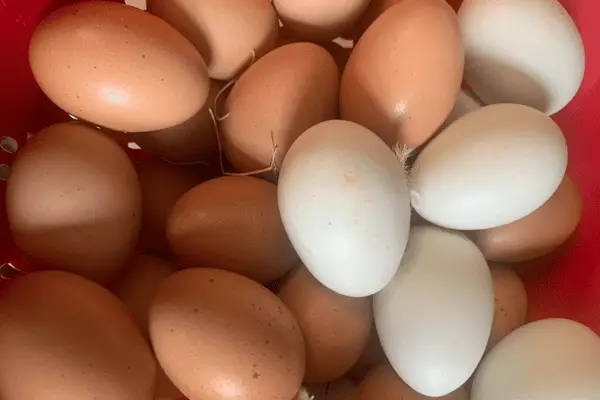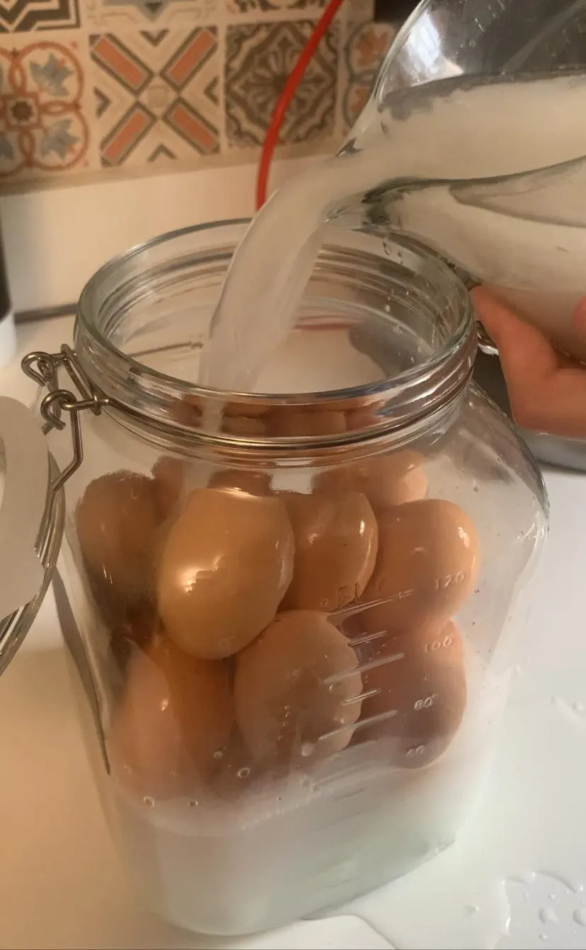Water Glassing Eggs: How to Preserve Your Harvest

If you raise chickens, water glassing eggs is a must! Here’s how to preserve your extra eggs so that you’ll have them during the winter months, when egg production is low.
What is Water Glassing?
“Water glassing” is a traditional method for preserving freshly laid eggs using water and lime (calcium hydroxide). There are many advantages to water glassing eggs, especially if you are looking for long-term, natural egg storage.
Advantages of Water Glassing Eggs
- Long-term preservation: When done right, water glassing may preserve eggs for more than a year and up to 18 months, according to Lisa Bass of Homestead on Boone. This is a significant advantage over simple refrigeration, which has a much shorter storage timeframe (about three months).
- Maintains egg quality: Water glassed eggs tend to retain a texture and flavor very close to fresh eggs, unlike other methods like freezing or dehydrating, which may slightly alter the egg’s consistency. Pro tip: If you are planning to make mayonaisse or meringues, we highly recommend water glassing eggs over freezing. Learn more about how to freeze eggs with instructions from Peter Geiger, Farmers’ Almanac Editor Emeritus.
- Off-grid capability: This method doesn’t require electricity, making it ideal for those who may experience power outages or are otherwise looking to be self-sufficient.
- Natural preservation: Using hydrated lime (calcium hydroxide) is a relatively natural method—great for those who prefer avoiding chemical preservatives.
Why Keeping the Egg’s “Bloom” is Important
The “bloom,” or cuticle, is a natural protective layer on the eggshell. It acts as a barrier, preventing bacteria from entering the pores of the shell and reducing moisture loss.
Maintaining the bloom is crucial for long-term egg preservation. When the bloom is intact, eggs stay fresher for a significantly longer period. Water glassing relies on the bloom. Therefore, unwashed eggs are essential for this preservation method. (Please note: Eggs from the grocery store are washed, removing the bloom, which is why they must be refrigerated. We do not recommend attempting to water glass store bought eggs.)

You can gently wipe eggs with a moist paper towel to clean off any dirt. However, washing eggs removes the protective bloom and the eggs should be stored in the refrigerator and used within two weeks.

Instructions for Water Glassing Eggs
Ready to water glass your fresh eggs? Here’s how:
What You’ll Need
- Clean, unwashed eggs that have been laid in the last 48 hours. (As mentioned above, you may wipe off dirt, but do not fully wash your fresh eggs or else it will disrupt their blooms.)
- Pickling lime. (You can find this food grade lime in the canning supply section of most stores.)
- Distilled water. (Distilled water is preferred as tap water—especially city water—contains compounds that may create bacteria or otherwise interfere with your lime’s effectiveness.)
- Glass mason jars. If you have a lot of eggs, you can also use a food grade bucket.
- Rubber gloves. (We use gloves because lime can irritate sensitive skin.)
- Label or sticker and pencil or marker (for writing the date).
Directions
- Place your eggs with the smaller end pointing downward in the jar.
- Use 1oz of food grade lime (calcium hydroxide) for each quart of water. Distilled water at room temperature is best as cool water makes it hard for the lime to dissolve.
- Using gloves, stir the lime into the water until dissolved.
- Pour the water glassing solution over your eggs until they are completely submerged.
- Write today’s date on a label and place on your container to keep track of timing.
- Store your water glassed eggs in a cool, dark, and dry place.
Note: It is normal for the lime to settle to the bottom. Water glassed eggs can be stored for up to 18 months.
How to Eat Water Glassed Eggs
To use the eggs, rinse under cool water and use as you would fresh eggs.
Other Preservation Methods
There are several ways to store eggs to use when production slows down in the winter. You can freeze eggs by cracking each egg into a clean ice cube tray. Once frozen, transfer the frozen eggs into a freezer safe storage bag or vacuum seal to prevent freezer burn.
Frozen eggs may be stored for up to a year in the freezer. To use, thaw overnight in the refrigerator or rinse under cool water. See additional details about freezing eggs, bread, butter, and more.
A Special Note From Cameron About Raising Chickens
Raising chickens has saved my family on the cost of eggs and helped us live a healthier lifestyle. They’re also fun to have around! Our chickens lay about 250-300 eggs per year. They keep pests out of our garden (snails, moles, and voles) and also help with weed control. Eggs shells and chicken manure are rich in nutrients for composting too.
Do you have any questions? Let us know in the comments below!
Our chickens have added more to our lives than we ever expected. They are a part of our family and have brought a lot of fun to our day. They also make my Soul Man Sweets recipes shine. Here is my grand-prize winning recipe for Farmers’ Almanac annual recipe contest.
Psst … If you have chickens or are considering getting them, check out these tips for building a DIY chicken coop.
Join the Discussion
Did our tips for water glassing eggs help you?
What is your preferred method for preserving fresh eggs?
Share your experience with us here in the comments!




